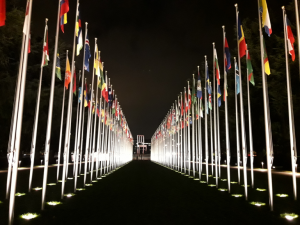
View from UN Building, Geneva
On the third day of the IGF proper, IFLA had the opportunity to join with the coordinators of the IGF’s Dynamic Coalitions – self-organised groups of people from civil society, governments and business interested in finding practical solutions to some of the challenges posed by the Internet.
There’s a wide range of groupings, from technical questions such as blockchain, to subjects like child online safety. As well as the Dynamic Coalition on Public Access on Libraries, jointly coordinated by IFLA and Electronic Information for Libraries (EIFL), a number of others look at ways of getting the remaining billions of the world’s population online.
The Dynamic Coalition on Community Connectivity explores the potential of community networks – physical networks build (or at least funded) by members of a community, independently of existing telecommunications companies. These can operate at the level of a village, up to that of a whole region, as in the case of guifi.net in Catalonia.
They can provide a response to the lack of interest by private companies in investing in poorer areas, and offer greater freedom from invasions of privacy. Importantly, they turn on its head that connections to people are the ‘last mile’. They should instead, be the ‘first mile’ of networks built on a more democratic basis.
Libraries can play a major role in such networks, from simply being a physical hub connecting the community to the wider network, to supporting users develop the skills and confidence both to build infrastructure, and develop local content and services.
The Dynamic Coalition on Connecting the Unconnected has worked hard to collect evidence of innovative approaches to boosting connectivity in under-served regions. Their work spans the world, making it possible to take some first steps towards understanding what determines the success of efforts to get people online.
Anyone interested in understanding how we can get the remaining four billion people online is recommended to follow the work of these groups. IFLA and the Dynamic Coalition on Public Access in Libraries will be looking for opportunities for collaboration.
We also took part in the kick-off consultation on the second phase of UNESCO’s Internet Universality project. This is an admirable effort to identify all of the factors that make the Internet accessible to – and usable by – everyone, and to determine indicators which make it possible to assess how individual countries are doing.
This work won’t be leading to a league table. Rather, it’s the mass of evidence that will be gathered in responding that will be most useful in terms of understand what makes for an inclusive Internet in each country. Covering everything from legal guarantees of access to knowledge to disaggregated data on who is using eLearning or eHealth services, this will make a major contribution to library thinking. IFLA will be responding to the second round survey, and encourages national associations and anyone else interested to do the same.
Tomorrow is the final day, and we’ll be offering a few reflections on the week as a whole.